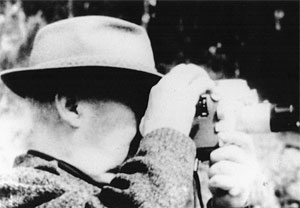 |
||||||
|
By Susan Gerhard STARS OF JAY Rosenblatt's distinctive, personal films include Stalin, Hitler, Franco, Mussolini, Jesus, a sleeping cat, and a boy in a raincoat. It's the boy – fascinated by worms or torturing ants, clipped from a vintage educational film or terrified at witnessing the primal scene between his parents – who most often gets the starring role. One of the most vivid through lines in a body of work that jumps from the dream life of cats to Christian anti-Semitism to the private lives of despots is that moment when innocence gets rerouted. The boy is always there, and even when he's not, his shadow lurks. Rosenblatt was a therapist before he was a filmmaker, and his subjects are often on the couch. Even the tabby star of the award-winning 2001 film "Nine Lives (The Eternal Moment of Now)" has issues: birth, trauma, dogs, death. Sometimes Rosenblatt's films lull viewers into the idea that they're going nowhere, just being chugged along on a meditative, uniquely edited, ride – until he drops an ending that leaves them stunned. "Prayer," Rosenblatt's own entry in the traveling 2002 program called "Underground Zero," which he curated with Caveh Zahedi, cuts between corn-fed Christians and Muslims around the world, both in prayer, until they're not: the film closes with an image that looks so much like prayer it makes you wonder – a duck-and-cover drill from fear-crazed cold war America. "When I was collecting the footage," Rosenblatt says, "I saw this connection between faith and fear, crystallized in this one cut between Arab men praying in the desert and these '50s adults putting coats over their heads and crouching down in the basement. The movement was the exact same movement, and this amazing light went off in how connected they are, not just in the two images, but conceptually, how faith and fear play into one another." He and Zahedi quickly curated their own shorts with others from independent filmmakers into a program that hopped from Nashville to Texas to the Red Vic to Seoul in the 12 months between Septembers '01 and '02. While TV news droned ceaseless rehash, "Underground Zero" intervened on our behalf. Rosenblatt, who usually works with footage he finds, or inherits, or collects from distant archives and school districts, has a subject that has recently found him: his 19-month-old daughter, Ella. His psychologist's eye, which has so often looked back with collage is now being forced into real time. Says the filmmaker, from the editing studio that sits at the basement of his Castro flat, "It's hard to film anything but her." |
||
